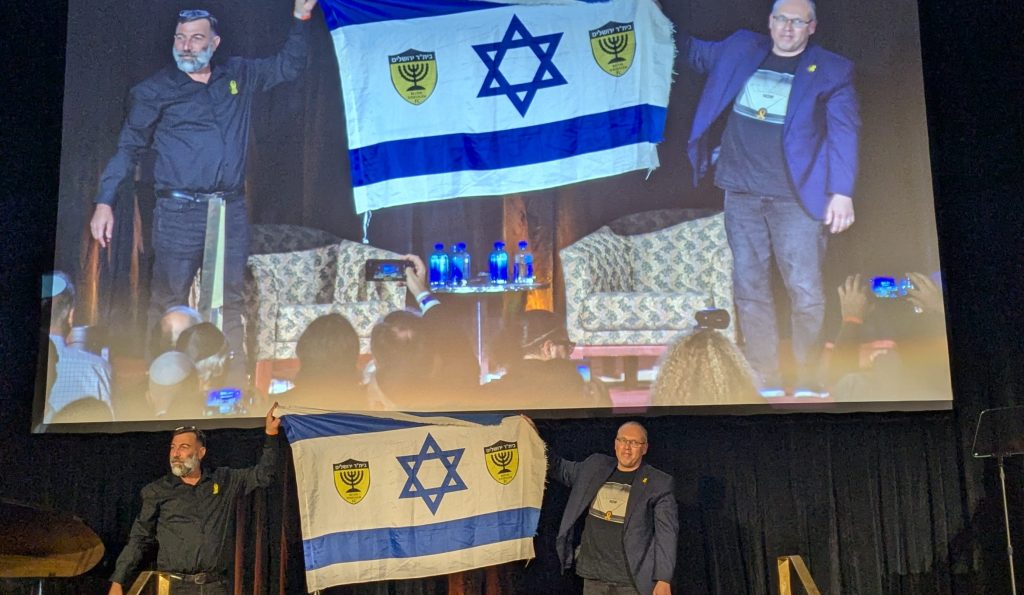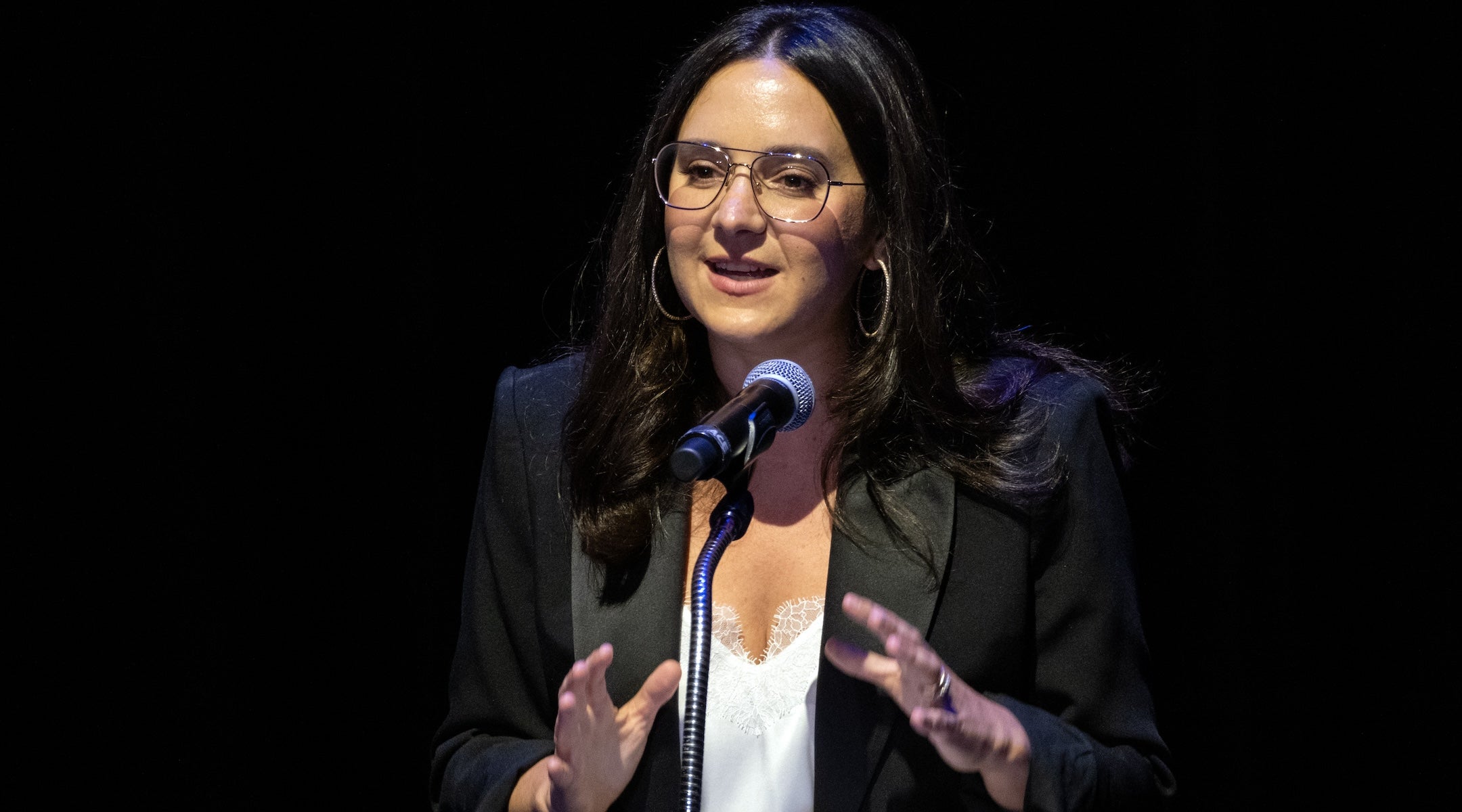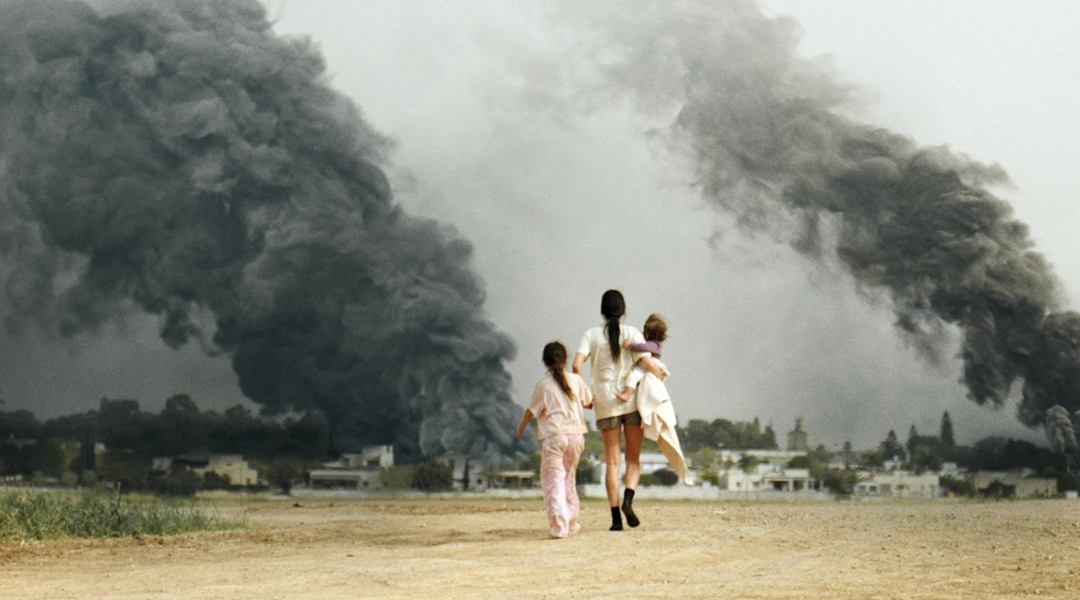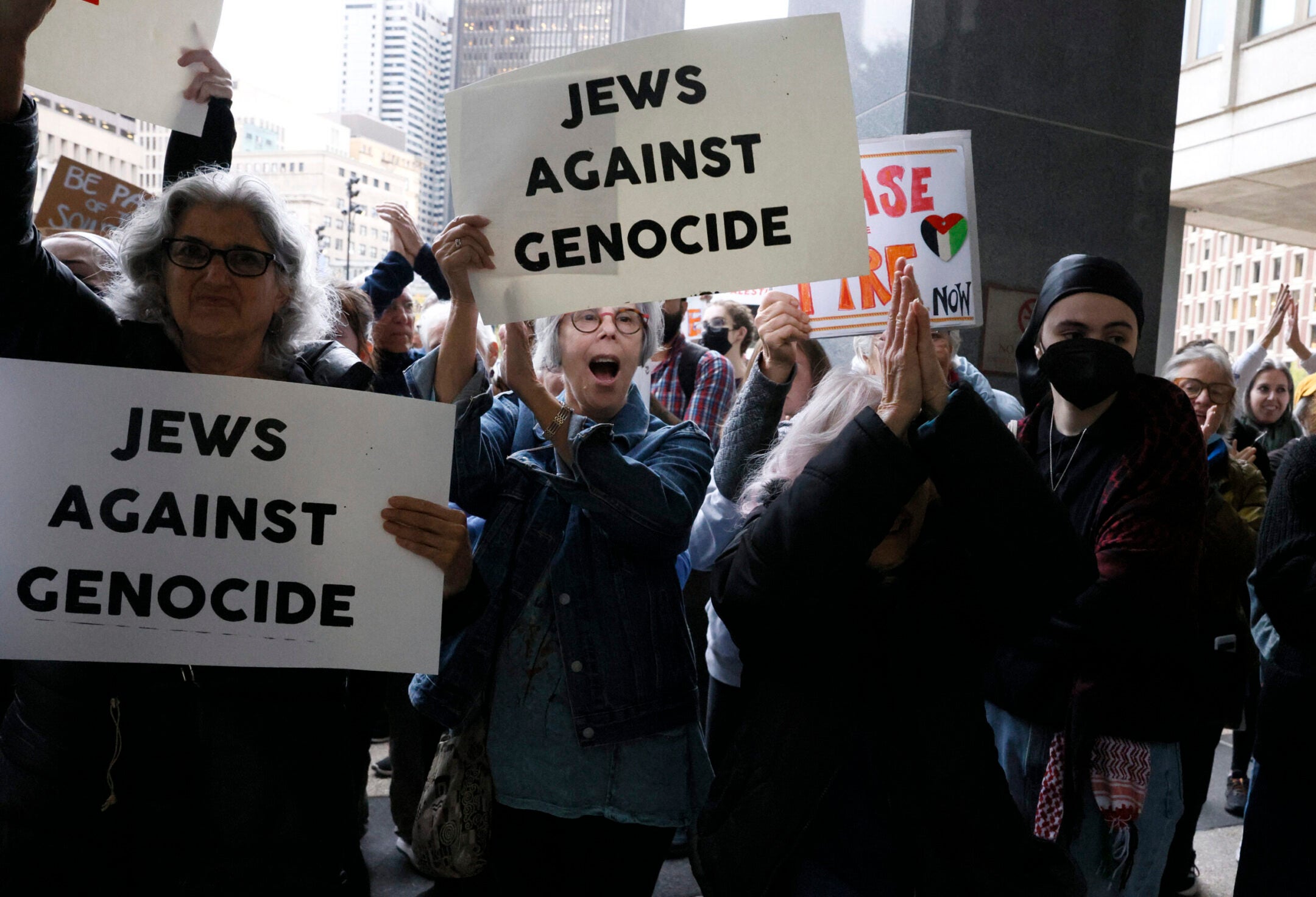Uncategorized
Stories of loss and heroism featured in Toronto’s commemoration of Oct. 7

Personal stories of lost loved ones, including the mother of one of the eight Canadians who was killed, and a harrowing, heroic tale of a man who rescued more than 100 people from the attack on the Nova music festival, marked the two-year commemoration of the Oct. 7, 2023 Hamas-led attacks on Israel.
The UJA Federation of Greater Toronto event on Oct. 5 at Beth Tzedec Congregation featured the stories of Raquel Look, mother of Alexandre Look, who died saving others during the Nova Festival attacks, and Oz Davidian, who rescued 120 teenagers in more than 15 trips in his truck, as detailed in the 2024 documentary Oz’s List.
Hundreds of attendees, including numerous elected officials, took in the program, including Toronto Mayor Olivia Chow, whose absence at the previous year’s commemorations drew criticism and compounded frustrations with Chow’s office from many Jewish community members.
Sporting a yellow ribbon pin for the hostages, Chow was among several public officials in attendance, including Ontario Premier Doug Ford, former Toronto mayor John Tory, Vaughan Mayor Steven Del Duca, MPs Melissa Lantsman and Leslie Church, and a host of Toronto and Vaughan city councillors and provincial MPPs.
Attendees were greeted by a number of visual exhibitions, including a series of photos and text along a corridor telling the stories of Oct. 7 in Israel and the community’s experience in Toronto since that day, with a record 56,000 participants at the Walk With Israel last May.
Outside the synagogue’s sanctuary, where the program was held, in a quieter Yahrzeit memorial space, a series of small lightbulbs, and their reflection on the wall, represented the 1,200 lives lost in the attacks. Participants activated the lights by turning the bulbs, which slowly illuminated the otherwise dark space during the event.
A third installation comprising 48 giant yellow ribbons on stands, and signs named each of the remaining hostages, of whom around 20 are estimated to be alive, and focused on the return of those captives, who by the Oct. 5 event had been held for 730 days in Gaza.
The program included songs, prayers of mourning, and a featured conversation with Look, followed by Davidian’s self-narrated tale of rescuing festivalgoers, shared onstage through a translator.
Idit Shamir, Consul General of Israel for Toronto and Western Canada, recalled the death of her cousin, who stayed during the evacuation call at Kibbutz Kissufim, to feed the animals, she said, before describing how terrorists came through the door and shot the 70-year-old man, then dragged and manipulated his bloody body and posed for a selfie— “making sure the world saw,” she said.
“Two years ago, I saw pure evil. So did you,” Shamir said. “And since that day, I stopped being who I was before. I think we all did.”
She spoke about the responsibility, as Israel’s representative, to the families of the eight Jewish Canadians who were killed in the attacks, weaving their life, and death, stories into her tribute.
“I carry the weight of my nation’s pain and my responsibility to honour these heroes,” Shamir said.
“Alexandre Look, who ran towards danger to save others, until courage cost him everything. Tiferet Lapidot, who painted her dreams in Canadian colours, and Israeli light, until darkness came. Judih Weinstein Haggai, whose poetry touched souls on two continents, until silence fell. Vivian Silver, who dedicated her life to peace, driving Palestinians to Israeli hospitals, until hatred claimed her.
“Netta Epstein, who jumped on a grenade to save his girlfriend. Shir Georgy, who danced between worlds, until the music stopped. Adi Vital-Kaploun, who protected her babies with her life, but they were still carried to Gaza. Ben Mizrahi, who carried Vancouver’s rain to Israel’s desert, until storm clouds gathered.”
Shamir commented on the difficulty of measuring “two years that changed everything,” describing the tensions that have unfolded in Canada since the attacks and subsequent war, including the “denial, celebration, and justification, here in Canada and around the world” of the Oct. 7 attacks.
“The traumatic impact of that day has not gone away,” she said.
“We measured it in shock, at the escalating harassment, violence, and intimidation against us… [in] the support for terrorism, the indoctrination of youth, the attempts to erase our voices, and make us into pariahs. Physical attacks on schools, synagogues, and Jewish-owned businesses. The boycotts. The demands made only for Jews. Teaching materials that erase Israel from the map. Indoctrinating children … yes, even here in Toronto,” she said.
“What we saw on the streets of Toronto, and across Canada, for the past two years, the calls for intifada, the flags of a listed terror organization, goes well beyond peaceful protest. It goes beyond antisemitism. This is a declaration of war against our Western values.”
In a moderated discussion, Look explained to—or, in some cases, reminded—audience members that she had been in contact with her son between the start of the attacks and his death at their hands, trying to fight them off and protect others at a bomb shelter with no door where he and other festivalgoers had taken cover.
Look and her son had spoken for an hour-and-a-half that morning, in between Alexandre’s momentary safety, and the attackers’ return.
When asked how she now draws strength, Look (who attended with husband Alain, Alexandre’s father), said she taps into her courage by remembering what her son faced compared to what she needs to do.
“I say to myself, if he was brave enough to face pure evil, I can be brave enough to put on my Magen Davids all over myself, and speak and be a voice for him, for all the ones that sadly, their voices, their lives were taken away, so young, so brutally,” she said.
“We are the descendants of the Maccabees,” she said to applause. “October 7 will be the last massacre on Jewish people that we will memorialize.”
The documentary’s title, Oz’s List, Davidian explained, came from the list of survivors he started after he’d begun ferrying stranded teens from the festival site to safety at his moshav.

He described taking back routes through valleys and fields to avoid the road where armed terrorists would be waiting. Then, during one of his return trips to find survivors, he realized his white pickup truck resembled that of the Hamas-led attackers, and pinned an Israeli flag in the truck cab to signal safety for any living festivalgoers he could pick up.
“They understood I’m one of them, and I came to rescue them,” he recounted through translator Tomer Regev.
In one trip, he managed to take 17 teenagers, he said. Later, reaffirming if he would do it all again, Davidian said he would.
“It’s my country … my people,” he said, through Regev. “These are our brothers. These are our children.”
Noah Shack, CEO of the Centre for Israel and Jewish Affairs (CIJA), noted that the moment of reflection two years after Oct. 7 came after a terrorist attack last week on Yom Kippur, in Manchester, England, where two people were killed and others were seriously injured.
“We’re seeing that the same violence that occurred two years ago is still alive and well, targeting Jewish people, not just in Israel, but around the world,” he told reporters.
He called for government leaders to take “urgent action to push back against the radicalization that we’re seeing, the glorification of terrorism and violence and the anti-Jewish hate that’s festering and leading to these attacks taking place.” He mentioned attacks on synagogues since Oct. 7, and the stabbing last month of a Jewish woman in a supermarket in Ottawa.
“These are things that should not be happening in Canada, to our community or to any community.”
Still, while “it’s important for our community to stay focused on what matters,” he said, including the remaining hostages and “the righteousness of our cause in fighting against terror” and hate, Shack reminded the Jewish community it does have support from a range of Canadians.
“There are many who stand with us, far more Canadians who are with us than who are against us.”
Daniel Held, UJA’s chief program officer, wants non-Jewish Canadians to understand the community’s current security needs, and what’s behind those expenditures.
“We’re on High Holidays. We come under guard and under incredible security because we are under threat,” he said. “Our community has been forced to spend tens of millions of dollars on security.”
Still, he noted, the community yearns for hopeful news about the hostages, and a peace deal, from Israel.
Talks between Israel, Hamas, and mediators including U.S. representatives were ongoing in Egypt this week to discuss U.S. President Donald Trump’s 20-point peace proposal.
Elsewhere in the Greater Toronto Area on Oct. 5, Raquel Look joined the weekly Run For Their Lives event in Thornhill, Ont., while other weekly events included the 105th edition of the Rally for Israel at Bathurst Street and Sheppard Avenue in the north end of Toronto.
Fashion designer Rinat Samuel, who since Oct. 7 has created T-shirts with the slogan “it’s not fashionable to be antisemitic!” and others, held a photo shoot at North York’s Mel Lastman Square.
And, in downtown Toronto, the Miles Nadal JCC hosted a sunrise pre-Sukkot ceremony early on Oct. 6, led by Beth Tzedec’s Aviva Chernick and Yacov Fruchter, to “mark this tender moment in the calendar” as a community.
The post Stories of loss and heroism featured in Toronto’s commemoration of Oct. 7 appeared first on The Canadian Jewish News.
Uncategorized
Bari Weiss, Free Press founder who started as antisemitism crusader, named editor-in-chief of CBS

(JTA) — Bari Weiss, the journalist who first rose to prominence for her campus campaign alleging antisemitism two decades ago, has been named editor-in-chief of CBS News, a stunning ascent that marks one of the most consequential appointments in American media in recent years.
The appointment came as Paramount Skydance, led by David Ellison, announced its $150 million purchase of The Free Press, the publication Weiss founded in 2022. Weiss will oversee both outlets as editor-in-chief, reporting directly to Ellison. The move marks a major shakeup for a legacy news division long associated with mainstream liberalism and a bet on Weiss’s brand of provocative centrism.
Ellison’s involvement adds another layer of intrigue. The son of Larry Ellison, the Oracle founder known for his pro-Israel philanthropy, David has in recent months gained attention as his father helped spearhead a bid to acquire TikTok’s U.S. operations. The forced sale, mandated by a new U.S. law aimed at separating the platform from its Chinese ownership, has drawn political scrutiny and elevated the Ellisons’ influence at the intersection of media, tech, and geopolitics.
For Jewish observers, Weiss’s trajectory carries special resonance. Her public identity has long intertwined with Jewish causes, Israel advocacy and debates over antisemitism and free speech. Under her leadership, The Free Press has become a prominent voice on the American Jewish experience, particularly its coverage and commentary supporting Israel and condemning rising anti-Israel activism after Hamas’ Oct. 7, 2023, attack on southern Israel.
Born in Pittsburgh and educated at Columbia University, Weiss first emerged as a student activist in the early 2000s when she campaigned against professors she accused of anti-Israel bias, a battle that foreshadowed later campus wars over Zionism and academic freedom. A film she co-produced called “Columbia Unbecoming” documents her account.
Raised in a Reform Jewish household in the Squirrel Hill neighborhood, her connection to the community became national news with the 2018 shooting at the Tree of Life synagogue, the congregation where she had her bat mitzvah. The massacre, she wrote, was an “alarm bell” that shook her out of a “holiday from history.” She channeled the tragedy into a book, “How to Fight Anti-Semitism,” in 2019.
Now 41, Weiss has positioned herself as a defender of open inquiry within liberal institutions and a critic of what she saw as left-wing intolerance. She rose through the editorial ranks at The Wall Street Journal and The New York Times, where she became known for her critiques of “cancel culture.” Her 2020 resignation letter from the Times, alleging bullying and ideological conformity, went viral and turned her into a hero for many self-described centrists.
When she launched The Free Press, Weiss promised to create a home for “free thought and fearless reporting.” The site quickly grew into a digital media powerhouse, attracting major investors and millions of readers, but also attracting criticism from those who say Weiss’s project is a polished rebranding of right-wing media.
Now she will have the chance to bring her brand of journalism to a much broader audience, as the top editor overseeing coverage at a legacy news organization whose properties include “60 Minutes” and “Sunday Morning.”
“As proud as we are of the 1.5 million subscribers who have joined under the banner of The Free Press — and we are astonished at that number — this is a country with 340 million people. We want our work to reach more of them, as quickly as possible,” Weiss wrote in a letter to readers on Monday. “This once-in-a-lifetime opportunity allows us to do that.”
The post Bari Weiss, Free Press founder who started as antisemitism crusader, named editor-in-chief of CBS appeared first on The Forward.
Uncategorized
On Paramount+, Apple TV, HBO and more, Oct. 7 emerges as a cinematic subgenre

(JTA) — Two years after the Hamas attacks on Israel, the tragedy of Oct. 7 has become its own cinematic sub-genre. Filmmakers have rushed to bear witness, survivors have taken up cameras, and streaming platforms are now filled with documentaries and dramatizations that revisit, reimagine, and attempt to process the day’s horrors.
From raw documentaries of the Nova music festival to scripted miniseries debuting this month, these works show how Israelis, and Jews around the world, are still grappling with a single day that reshaped their lives.
The desert rave that became the site of mass murder has inspired a cluster of films, each offering a different register of witness.
“We Will Dance Again” is a documentary that offers a chronological, minute-by-minute account of the Oct. 7, 2023, Hamas attack on the Supernova Music Festival in Israel. The film is constructed primarily through the first-hand testimonies of over a dozen survivors, interweaving their accounts with footage they recorded on their cell phones and video recovered from the cameras of the attackers. The documentary is available to stream Paramount+.
“#Nova,” now on Prime Video, adds new layers of forensic detail by synchronizing video captured by the victims on their personal cell phones with footage recovered from Hamas body-worn cameras. “Supernova: The Music Festival Massacre,” on Apple TV and YouTube, stitches together real-time footage and interviews to convey the disorienting chaos of the first hours.
A more intimate companion piece, “Tattooed for Life,” which played across many film festivals but is not currently streaming, follows tattoo artist and survivor Liraz Uliel as she memorializes fellow festival-goers through a shared fractal tattoo design, an act of mourning turned into community ritual.
Other filmmakers have turned their attention to what happened in the homes, fields and kibbutzim of southern Israel.
The PBS documentary “After October 7: A Personal Journey to Kfar Aza” offers a close look at one of the hardest-hit communities, combining news footage with deeply personal reflections on grief, displacement and rebuilding.
Currently in theaters, “The Road Between Us: The Ultimate Rescue” chronicles retired general Noam Tibon’s desperate drive south to save his son, journalist Amir Tibon, and his family. Blending firsthand testimony with security footage of real-time chaos, the film recounts the former general’s 10-hour, high-stakes mission across a country under siege to rescue his loved ones from their home in Kibbutz Nahal Oz. The film won the People’s Choice Award when it premiered at the Toronto International Film Festival after some turmoil.
Two scripted productions expand these same themes. “Red Alert” (known in Hebrew as “First Light”) is a four-part miniseries that dramatizes five intertwined true stories of civilians, police, and first responders, and is executive-produced by Lawrence Bender, of “Pulp Fiction” fame. The series weaves these chaotic narratives together in a race-against-time format and premieres on Paramount+ on Oct. 7, making it one of two major scripted series to debut on the second anniversary of the attack.
The second series, “One Day in October,” an anthology series based on seven distinct personal stories, will debut on HBO Max on Oct. 7, with all seven episodes available for the U.S. audience.
Many documentaries are meant as a bulwark against denial.
“Bearing Witness to the October 7th Massacre,” a 47-minute film, compiled by the Israeli military, compiles raw footage from multiple sources, including Hamas body-cam recordings, dash cams, CCTV, and victims’ phone videos, to create a chronological record of the atrocities. Due to its graphic nature, the film has not been released to the general public and is only shown in private, invitation-only screenings for policymakers, journalists, diplomats, and community leaders around the world.
A documentary created by Sheryl Sandberg, “Screams before Silence,” address the sexual violence and gender-based atrocities perpetrated by Hamas during the attacks. It is intended to break what critics have described as a moral silence on these war crimes and is streaming on YouTube.
“The Killing Roads” does narrow its focus to the attacks on Route 232 and Highway 34, which were the main arteries where Hamas gunmen ambushed and killed approximately 250 people fleeing the Nova festival and surrounding communities. The film has been released for free viewing on platforms like YouTube and a dedicated website to combat denial of the massacre.
The PBS documentary “October 7th: Through Their Eyes” is focused on a network of Israeli volunteer archivists who immediately set out to preserve the large volume of digital evidence, including social media posts, videos, and messages, from survivors and victims before the content could be deleted or lost. The goal of their project, October7.org, is to create a widely accessible, permanent database of first-hand testimonies.
Several recent works focus on the ordeal of captivity and survival.
“The Children of October 7,” streaming on Paramount+ and hosted by activist Montana Tucker, profiles eight young survivors (ages 11-17) who share harrowing, unscripted testimonies of narrowly escaping death, witnessing the murder of family members, or enduring captivity, and highlights their resilience in the face of unspeakable loss.
Meanwhile, the short documentary “A Letter to David” sees the filmmaker revisit his onetime actor and friend, David Cunio, who remains held in Gaza along with his brother, Ariel Cunio, after being kidnapped from Kibbutz Nir Oz. The film is a collage of family footage and archival material that functions as a cinematic plea for his return.
As the shockwaves of Oct. 7 spread around the world, another crop of films has examined how the attacks reverberated across the Jewish Diaspora and within movements for and against Israel’s war.
The documentary “October 8” (previously titled “October H8te”) captures the anti-Israel protests that erupted across U.S. cities and college campuses in the days and weeks following the attack. It is streaming on Apple TV and Amazon. “The New Jew: Days of War” follows Israeli comedian Guri Alfi as he travels across North America to explore Jewish identity and division in the aftermath.
“Torn: The Israel-Palestine Poster War on NYC Streets” documents the dueling “Kidnapped” and “Free Gaza” posters that turned city lampposts into symbolic battlefields. And “There Is Another Way” portrays the Israeli–Palestinian group Combatants for Peace, whose members struggle to uphold their belief in nonviolence even as both societies harden in grief.
The post On Paramount+, Apple TV, HBO and more, Oct. 7 emerges as a cinematic subgenre appeared first on The Forward.
Uncategorized
Poll: 40% of American Jews believe Israel is committing genocide in Gaza

(JTA) — Multiple polls have found that about 60% of Americans believe Israel is committing genocide in Gaza, a biting charge that Israel and the United States reject.
Now, for the first time, a poll has taken the pulse of U.S. Jews specifically — and found that 39% of them hold the opinion.
The new poll by the Washington Post, conducted in early September prior to President Donald Trump’s latest breakthrough in ceasefire negotiations between Israel and Hamas, also found that 61% of American Jews said that Israel has committed war crimes against Palestinians.
While allegations that Israel is committing a genocide in Gaza have been lodged against the country by international bodies, human rights groups and pro-Palestinian activists, the poll suggests that charge is now resonating more widely among even U.S. Jews — those who are most likely to have a personal connection to Israel.
The poll found that many American Jews still hold strong ties to Israel. Three-quarters of American Jews surveyed said that Israel’s existence is vital for the long-term future of the Jewish people, while over half said that they were “very” or “somewhat” emotionally attached to Israel.
But emotional ties to Israel were far weaker among younger respondents. While 68% of American Jews over 65 said they were emotionally connection to Israel, among those aged between 18 to 34, that share dropped to 36%. Younger Jews were also more likely to call Israel’s actions in Gaza a genocide, with half of Jews aged 18 to 34 using the term.
The poll found that Jews were almost evenly split over Israel’s actions in Gaza, with 46% approving and 48% opposing. That divide was also split sharply on partisan lines, with 85% of Jewish Republicans approving compared to 31% of Jewish Democrats.
The majority of American Jews also blame Hamas more than Israel for the civilian death toll in Gaza, with two-thirds of American Jews blaming Hamas for starting the war and operating in civilian areas of Gaza, according to the poll.
The poll also found that criticism of Israeli Prime Minister Benjamin Netanyahu had significantly increased among American Jews in recent years. It found that 68% expressed a negative opinion of the Israeli leader, with 48% rating his leadership as “poor,” compared to 54% disapproving of him in a 2020 Pew Research Center poll.
On the continuation of the conflict between Hamas and Israel, vast majorities of the American Jewish community assigned blame to both Hamas and Netanyahu, with 91% saying Hamas bears responsibility and 86% saying Netanyahu bears responsibility.
As several European countries recognized Palestinian statehood last month, the poll also found that over half of American Jews believe that Israel and an independent Palestinian state can coexist peacefully with each other.
Looking to the relationship between the United States and Israel, about half of respondents said that U.S. support for Israel is at about the right level. A third of respondents said that the United States is too supportive of Israel, a share that jumped 10 percentage points since the 2020 Pew poll, and 20% said it is not supportive enough.
The Washington Post poll surveyed 815 American Jews from Sept. 2 to 9 and had a margin of error of 4.7 percentage points.
The post Poll: 40% of American Jews believe Israel is committing genocide in Gaza appeared first on The Forward.


